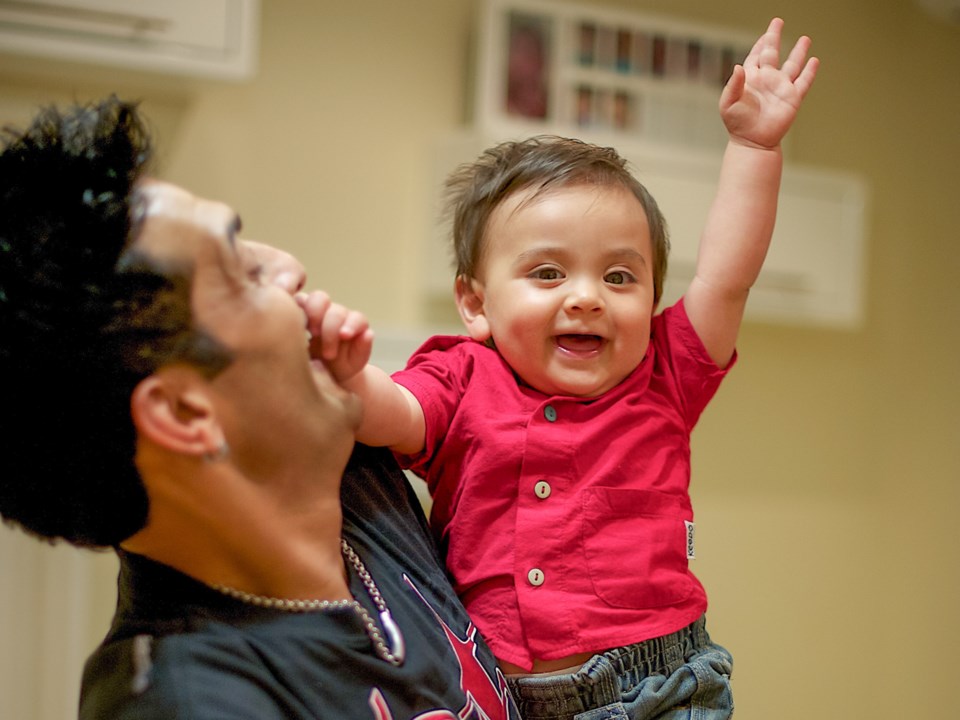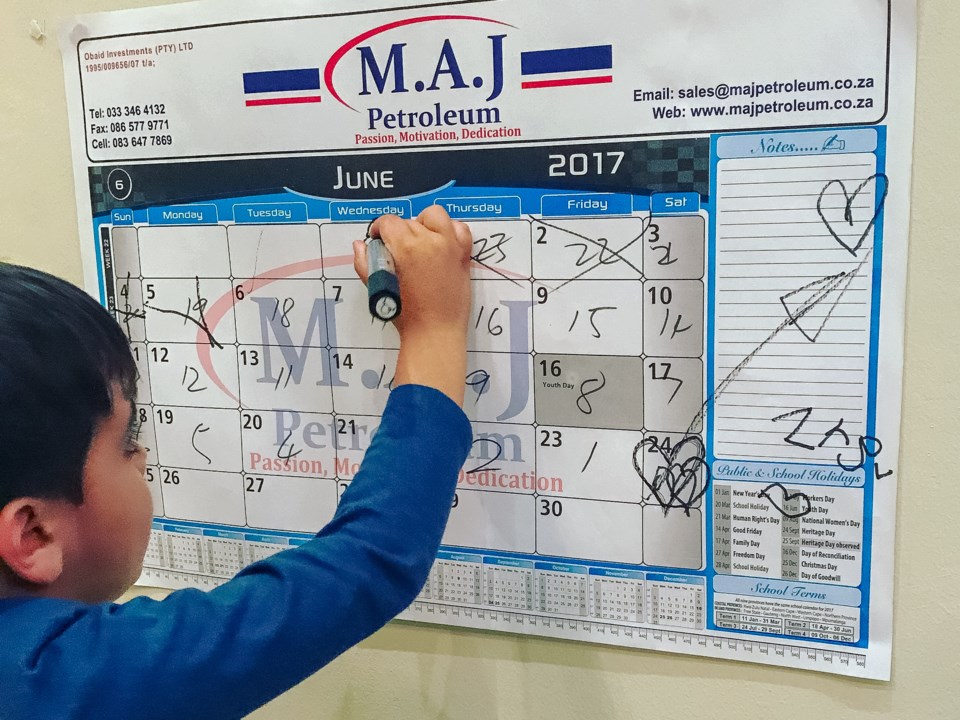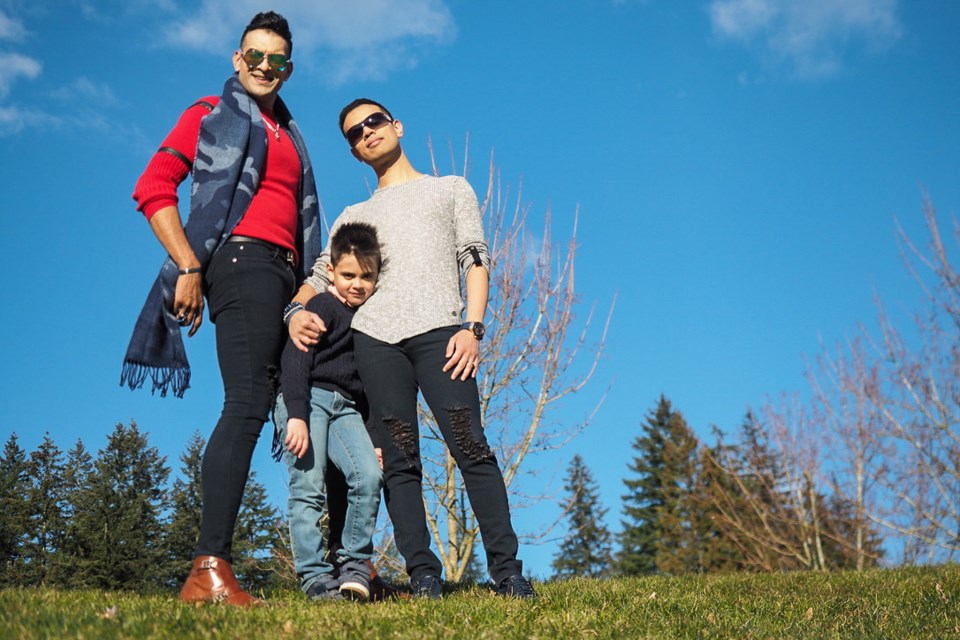On a crisp winter day in early March, seven-year-old Zrav bounces from a swing into his parents’ arms. The whirlwind of kids at Galloway Park on Burke Mountain does little to tame the boy’s affection for his two dads, Irshad Abdulla and Vishad Deeplaul. He runs to them, hugs them, seemingly unaware his family makeup may not be the same as those of the other children climbing and jumping and sliding.
The Coquitlam boy also knows next to nothing about the role he played in a historic court decision on a continent far away, how his life set off a legal battle that would cut to the very core of the South African constitution.
Open doors
Abdulla and Deeplaul first started dating in Pietermaritzburg, the capital of South Africa’s KwaZulu-Natal province. It was 2003, six years after then-president Nelson Mandela pushed through what many considered the most progressive constitution in the world.
Old apartheid-era laws that banned homosexuality under punishment of prison were struck down and a country that long carried the mantle of subjugation embraced gay pride, incorporating the rainbow into the national flag.
From the beginning, their relationship closely traced the footsteps of one legal milestone after another: Abdulla and Deeplaul got married in 2010, a few years after gay marriage was made legal and the same year that surrogate parents got full legal protection.
By then, Deeplaul was running the family’s event planning business and Abdulla was working full-time at the state IT corporation. That’s when the couple decided it was time to have a child with a surrogate mother.
After a year and a half of trying, two doctors and one miscarriage, heartache finally gave way to celebration.

A rocky road
The trouble began before Zrav was born.
As soon as Abdulla and Deeplaul learned their surrogate was pregnant, Abdulla went to his company’s human resources department to apply for parental leave as the parents-to-be were “preparing to the n-th degree,” taking courses on parenting, first aid and CPR for children.
“I thought my employer, being in the public sector, would realize, you know, this is the right thing to do and give me the time that I needed to take care of my child,” Abdulla told The Tri-City News.
At the time, most South African companies would give fathers two weeks leave while maternity leave lasted four months.
But somewhere between the national capital of Pretoria and Pietermaritzburg, the request fell into a bureaucratic black hole.
As the negotiations dragged on, Abdulla became increasingly agitated, finally approaching a lawyer through probono.org.
By denying Abdulla four months of parental leave, attorney Irvin Lawrence said, the government was denying Abdulla’s rights.
“The state would normally pay for that,” Lawrence told The Tri-City News. “The guy looked at him and said, ‘You’re not a woman. We’re not going to give you this leave.’”
That’s when the couple started the process of mounting a challenge. The government relented and said it would give Abdulla the equivalent of adoption leave — two months instead of the four months a mother would get.
“We said, ‘Not good enough,” Lawrence said.
A big part of maternity leave is to give the parent and child an opportunity to bond. But as the date grew closer, Abdulla grew increasingly worried he would miss out on those precious moments with his son.
“We didn’t know what was going to happen when we had the child,” Abdulla said. “I can’t take care of my child for two weeks and then come back to work with a newborn.”

Unapologetic
The first few months of the pregnancy, Abdulla was quietly submissive, hoping it would all work out. But when he was forced to take the matter to court, the experience lit a fire under him.
For years, the law had progressed in one area after another, from gay marriage to surrogacy. Now, a legal door was being slammed in the couple’s faces.
It was “the last step preventing us from living our lives,” Abdulla said.
By the time they had bounced from negotiations to labour commissions and, finally, to South Africa’s Supreme Court, the parents were ready for a fight.
“Vishad and I are not apologetic about anything in our lives,” said Abdulla. “I found myself thinking, why was I apologetic with this? Why was I going with my tail between my legs, cap in hand asking for a handout when it’s something that I should have got from the start?”
Tempered victory
In 2015, more than four years after their son was born, the court ruled the state had violated Abdulla’s rights and was forced to pay out the two months he never got to spend with his infant.
The case sparked sweeping changes to South Africa’s labour laws. Last November, president Cyril Ramaphosa signed into law several amendment bills that, among other measures, guaranteed 10 weeks of leave for same-sex fathers who have a baby through a surrogate.
And while nearly the entire sweeping package of labour amendments went into effect Jan. 1 of this year, Lawrence said the provisions for same-sex fathers is still waiting and likely won’t go into effect until after elections in May.

Starting over
Abdulla and Deeplaul are not ones to wait. Shortly after the court decision in 2015, they immigrated to Canada, settling in Coquitlam.
By then, a stagnant economy, fraud and corruption had taken their toll in their homeland. But it was the violent crime that brought them to Burke Mountain, they said (Deeplaul watched his father struggle through multiple surgeries after a thief broke into his house and shot him).
“When you go through incidents like that, it just makes you want to be in a safer place to grow up your kids,” Deeplaul told The Tri-City News.
While leaving home is never easy, the couple has found solace in the fact that, one day, they’ll be able to share what they achieved with their son. As they wait the final months for the law to take hold, it’s all finally sinking in.
“We feel like we’ve left a part of ourselves back in South Africa — permanently,” said Deeplaul, bursting into a chuckle.
“We were the first. We just did it and went with it all the way to the top.”
Click here to see the family's story on Instagram.
Stefan Labbé



